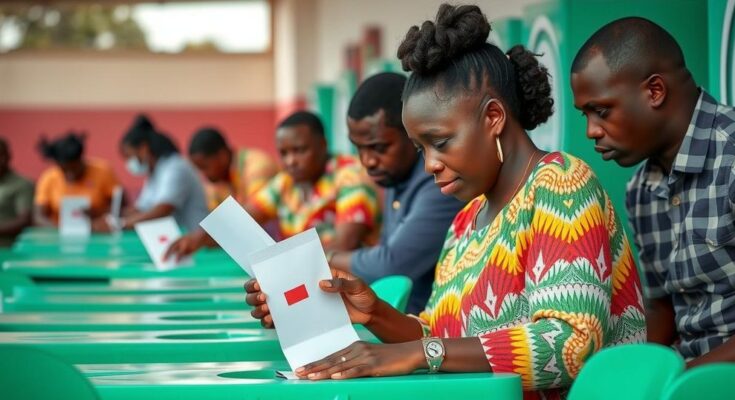Ghana is conducting presidential and legislative elections amid a deep economic crisis, with 18.7 million registered voters. The leading candidates, Vice President Mahamudu Bawumia (NPP) and former President John Dramani Mahama (NDC), offer little hope for significant change, as many citizens express dissatisfaction with the current state of affairs. The atmosphere in Accra remains upbeat, though concerns for the struggling economy overshadow the electoral festivities.
On Saturday, polls opened in Ghana for presidential and legislative elections amid a significant economic crisis that has cast a shadow over the voting process. Approximately 18.7 million registered voters are participating in these elections, which are deemed critical for evaluating the state of democracy in a region experiencing increasing political volatility due to coups and extremist violence.
Historically viewed as a model of democracy in West Africa, Ghana has faced severe economic challenges in recent years, suffering from soaring inflation and escalating unemployment. Recent polling by Afrobarometer revealed that 82% of Ghanaians perceive that their country is on the wrong trajectory, highlighting an urgent need for change.
The race for presidency features twelve candidates but primarily revolves around Vice President Mahamudu Bawumia of the ruling New Patriotic Party (NPP) and former President John Dramani Mahama of the National Democratic Congress (NDC). Both candidates offer limited hope for transformation, as their economic plans appear strikingly similar, despite their parties’ contrasting ideologies. The NPP has struggled with the economic crisis during its tenure, while the NDC, dismissed in 2016 for failing to fulfill economic promises, is attempting to regain public trust.
In addition to the presidential election, voters will also choose 276 members of parliament, increasing the stakes amid a highly competitive political landscape. The final campaign rallies showed contrasting visions for Ghana’s future, with Bawumia pledging continuity with an emphasis on economic stability, while Mahama called for a comprehensive “reset” across multiple sectors, including governance and infrastructure.
Despite a festive atmosphere in the capital of Accra characterized by political rallies and public displays, many citizens grapple with the realities of a struggling economy. Ghana’s recent defaults on foreign debt and inflation rates reaching 54% have led to increased prices for essential goods, leaving citizens skeptical about improvements. Additionally, the crisis of illegal gold mining, locally known as “galamsey,” has raised environmental concerns, exacerbated by the economic despair that has driven individuals to engage in such practices.
Ghana is positioned as a significant political and economic player in West Africa, having formerly been celebrated as a beacon of democracy and growth. However, over recent years, the country has experienced profound economic difficulties characterized by high inflation, unemployment, and widespread dissatisfaction with the government. The current electoral climate reflects prevailing economic concerns that are central to the decisions voters face at the polls.
The upcoming elections in Ghana serve as a pivotal moment for its democracy and political landscape in the context of a dire economic crisis. With limited differentiation between the two leading candidates and escalating socio-economic challenges pressing on citizens, the outcomes of these elections will likely have substantial implications for the nation’s future, both politically and economically.
Original Source: www.voanews.com




